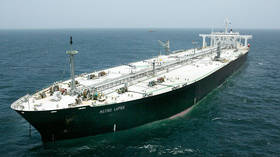Sanctions leaving dozens of oil tankers idle – Bloomberg

Dozens of oil tankers that previously shipped Russian crude currently remain empty and idle off the Russian, Chinese, and Turkish coasts after being hit by Western sanctions, Bloomberg reported on Wednesday, citing tracking data.
Some of the 53 vessels were reportedly targeted for breaching a G7 price ceiling on Russian oil exports, while others were designated for belonging to Russian state tanker enterprise Sovcomflot. Some were sanctioned over alleged environmental risks.
In February, the US targeted Sovcomflot and more than a dozen vessels affiliated with the state-owned firm.
According to data quoted by the news outlet, nearly all of the oil carriers that have been designated for breaching US, UK, and EU sanctions since October have been unable to take on any cargoes since. Only three of them were reportedly loaded, and subsequently turned off their transponders to hide further activities.
Bloomberg noted that freight rates, which are dropping partially due to sanctions, prove that the penalties have disrupted the movement of vessels but have failed to visibly raise Russia’s costs for individual cargoes.
Western governments introduced the price cap along with an embargo on Russian seaborne oil in an attempt to hit the country’s economy, while at the same time keeping Russian crude flowing to global markets so as not to trigger price hikes. The measures were imposed in December 2022, and were followed in February 2023 by similar restrictions on exports of Russian petroleum products.
Moscow responded by rerouting most of its energy exports to Asia, particularly India and China, where Russian crude can be sold above the West’s price cap as New Delhi and Beijing have opted not to join sanctions against one of the world’s biggest oil producers.












